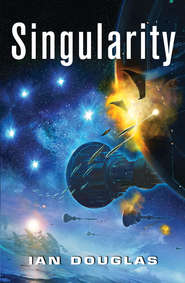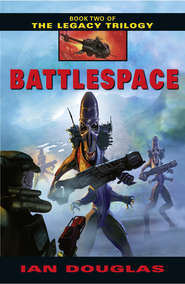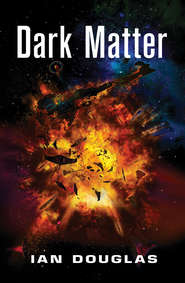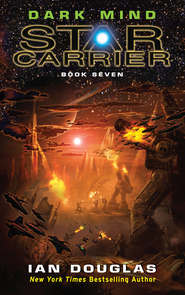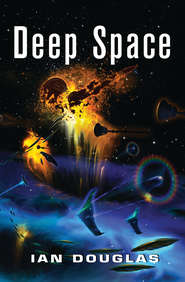По всем вопросам обращайтесь на: info@litportal.ru
(©) 2003-2024.
✖
Bright Light
Настройки чтения
Размер шрифта
Высота строк
Поля
“There’s something more.”
“What’s that?”
“The identity of the ship you will be using. It may be of interest to you.”
“Not America,” Gray said. And stifled the sharp pang at the thought of her. America, along with her sister ship, Lexington, had been badly savaged a month ago out at Kapteyn’s Star. Both carriers had made it back to Earth orbit, but they were in bad, bad shape.
“That is correct. America will be undergoing extensive repairs at the SupraQuito yards. Your vessel will be the Republic.”
His eyes widened at that. “The … Republic?”
People always talked about how damned small the Navy was. If you served long enough, you kept running into the same shipmates, the same vessels, the same commanding officers. This seemed to prove that ancient adage.
“Yes. She’s being taken out of mothballs and provisioned for the expedition. I believe you know her?”
“Hell, I was her CAG! I was her ACAG from oh-nine to eleven … then CAG from eleven to fourteen!”
“I know. Might that help you feel better about this assignment?”
“You know, I damn near cried when they retired her.”
“She was obsolete and overdue for retirement. As the Sh’daar War and the Confederation Civil War both wound down, she was taken off the line. However, the upgrades she will be receiving should again make her quite a formidable vessel.”
“Damn you, Konstantin.” But he relented. “Okay. But I still don’t know what you expect me to do or say.”
“I’ll be there to guide you, Captain.”
That wasn’t exactly an encouraging thought.
He was about to retort in kind when a bright star appeared in the dusk over the water of New York Harbor, rapidly approaching. Dropping lower, it resolved itself into a red-and-silver Sentinel 5000 autonomous flier. Its low-level AI pilot settled it gently on the observation deck and lifted the gull-wing door.
“So where are we going?” Gray asked as he ducked through into the passenger compartment. It was roomy and tastefully sleek inside—the luxury model. The robot pilot was invisibly tucked away somewhere forward. The dome roof gave him a full three-sixty view, and a thoughtclick would turn parts of the deck underfoot transparent as well.
“Geneva,” Konstantin told him.
Of course.
The door closed silently and the robotic transport rose into the sky on quietly humming grav-impellers. To the southwest he could see Lady Liberty, still on her pedestal after 540 years. Her right arm, which had broken off and fallen into the harbor at some point during the city’s decay, was back in place, the copper flame of her torch gleaming with the last touch of the setting sun. After centuries of neglect she once again represented the spirit of freedom and democracy in the North-American union.
But for how long that might ensue was anybody’s guess. North America had dodged two nasty bullets in the Sh’daar War and in the conflict with Pan-Europe.
As bad as they had been, though, Gray seriously wondered if it could survive the quiet rise of its own super-AI minds.
The flier swung about, still gaining altitude, and passed above the tallest towers of Lower Manhatt. As it did, the nagging question finally surfaced for Gray.
“I still don’t understand,” he told the super-AI partially resident within his head, “why you wanted me out of the Navy. It was my whole life …”
“I understand your feelings, Captain,” Konstantin said, using his honorary retirement rank—which felt like a needle digging into the wound. “But I—and you—encountered certain limitations in what we could do when you were part of the military hierarchy. In order to make contact with the Denebans, you will need a degree of freedom and free will impossible for a naval flag officer.”
“Bullshit. The president—”
“President Koenig has his own problems,” Konstantin explained, “and his own agendas. His decisions are closely circumscribed by those around him, and by the requirements of his office. I require a true free agent. Why are you, of all people, so wedded to your position within the military line of command?”
“Maybe because I belonged.”
Still, it was a good question, and one Gray had been wrestling with for a long time.
Gray had grown up in the Manhatt Ruins, a Prim making a marginal living working a small rooftop farm right over there … perched within the crumbling rooftop wreckage of the TriBeCa Tower, a couple of hundred meters above the flooded avenues of the city.
Damn … he couldn’t even locate the labyrinthine tower any longer. With nano-engineering, new buildings could be grown, and old ones completely made over into new structures in a matter of hours.
Made it easier to forget the past, he supposed.
More than three centuries ago, rising sea levels and the resultant social unrest had led to large swaths of what had been the coastal areas of the former United States of America being abandoned. The so-called Peripheries had been cut off from the technologies and from the social and governmental services of the new United States of North America. They’d become lawless frontiers too expensive to maintain, too difficult to control.
When Angela, his wife, had had a stroke, he’d been forced to get her to a medical center within the USNA proper. Angela had been healed … though either the treatment or the stroke itself had … changed her, dissolving her part of the emotional bond between them.
Gray had gotten over it … well, for the most part, at any rate. It had taken a long time and blossoming relationships with other people, but he’d finally done it. Sometimes he went for days now without even thinking of Angela.
And it had only taken him twenty-six years to get there …
In a world of such rapid changes, Gray was an outlier.
Overall, though, Gray had approved the unexpected course change in his life. In a quarter of a century, he’d worked his way up the ladder of rank, eventually commanding the star carrier America, and then serving as flag officer for the entire America battlegroup. He’d found a place for himself. He’d found respect—no mean feat for a former Prim in the Risty-dominated ranks of naval officers. Risties, derived from aristocrats, represented the worldview of a majority of USNA citizens and especially of naval officers. Primitives, lacking the high-tech cerebral implants and social e-connections of full citizens, were seen somehow as less than fully human.
It made Gray feel good that—even if it was just a possibility—his rise through the ranks, his accomplishments as a naval officer, even his victory over the aliens at Kapteyn’s Star all had been due to his fighting that old social stigma of Prim.
But now Konstantin had arranged to make him a civilian again. Of a sort, that is. Because he was still being swept up into bigger schemes.
It wasn’t like he could go back to the TriBeCa farm, though. No, the North-American government was taking the Peripheries back. Washington, D.C., had been fought over, drained, and rebuilt; swamplands from the Virginia Piedmont to Savannah were being reclaimed; here in Old New York City the Locust Point and Verrazano Narrows dams had been completed, and the water levels encroaching on Manhattan were slowly dropping.
Under steady assault by swarms of architectural nanoassemblers, the Ruins were ruins no more, as white towers grew from the sea’s retreating caress. For the past year, teams of neurobiotechnicians had been moving through the city, offering the inhabitants the chance to shed their status as Prims; soon, the very idea of Prims would be a thing of the past.
Just like me.
He studied the white towers from the sky … their lack of vegetation and obvious decay. Their clean sterility. Their bright newness in the lights of the city coming on to dispel the dark of early evening in winter.
He shook his head. There was no place for him any longer in the Navy and there certainly wasn’t a place for him down there among those newly grown skyscrapers. He felt out of place … and out of touch.
“Konstantin?” He still didn’t want to talk to the artificial intelligence, but he’d become too reliant on having his questions answered. Usually, that was handled by his own in-head RAM, but he was genuinely curious about what the AI would say.
“Yes?”
“What’s happening to them? The people like I was, down there in the Ruins?”
“Most have already been relocated.”
“Where?”






